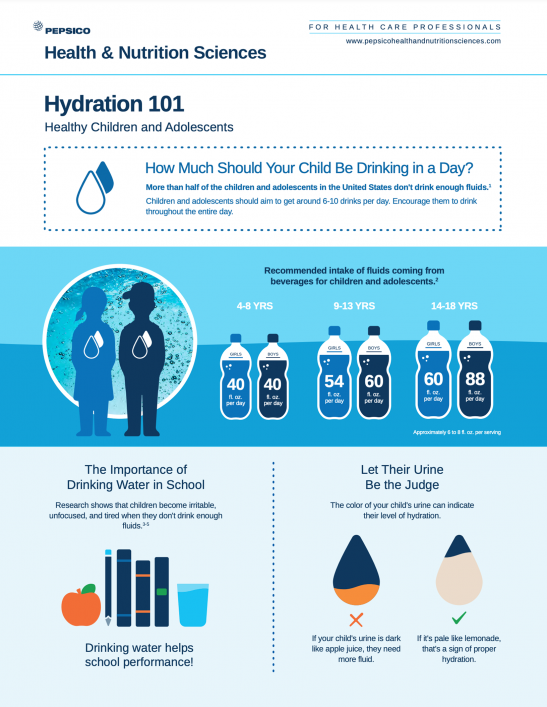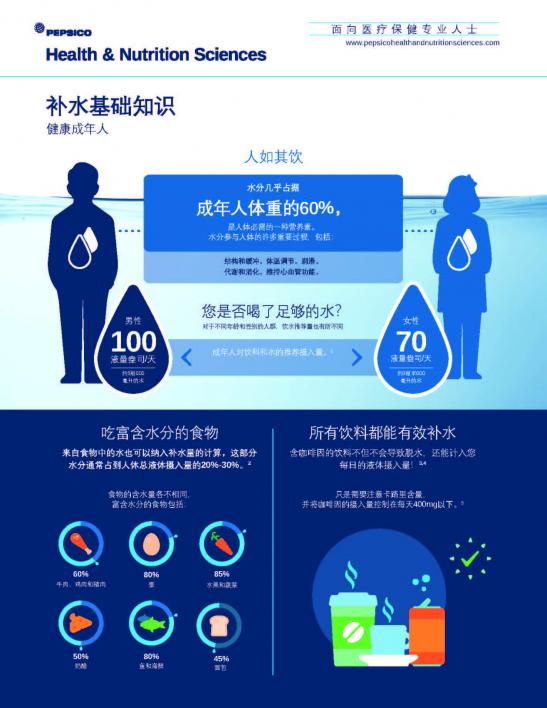Young, H. A., Cousins, A., Johnston, S., Fletcher, J. M., & Benton, D. (2019). Autonomic adaptations mediate the effect of hydration on brain functioning and mood: Evidence from two randomized controlled trials. Scientific Reports, 9(1), 16412. doi:10.1038/s41598-019-52775-5
Abstract:
Dehydration (water loss >2.0% of body weight) has significant negative effects on physical and mental performance. In two studies the effects of minor hypo-hydration (water loss <1.0% of body weight) on CNS function, mood and cardiovascular functioning were measured. Study 1: On two mornings twelve male participants were exposed to a temperature of 30 °C for four hours and either did or did not drink two 150 ml glasses of water during that time. Study 2: Fifty-six (25 M) individuals were exposed to the same 30 °C environment and randomly allocated to either drink (2 × 150 ml) or not drink. When not given water 0.59% (Study 1) and 0.55% (Study 2) bodyweight was lost. Participant’s heart rate variability (HRV) was measured, and they rated their thirst and mood. In study 1, participants participated in an fMRI protocol during which they completed a modified version of the Paced Auditory Serial Addition Test (PASAT), at the end of which they rated its difficulty. Decreases in fMRI BOLD activity in the orbito-frontal cortex, ventral cingulate gyrus, dorsal cingulate cortex, hypothalamus, amygdala, right striatum, post-central gyrus and superior parietal cortex were observed when participants were hypo-hydrated. These deactivations were associated with reduced HRV, greater perceived effort, and more anxiety. In study 2 declines in HRV were found to mediate the effect of hypo-hydration on ratings of anxiety. These data are discussed in relation to a model that describes how autonomic regulatory and interoceptive processes may contribute to the affective consequences of minor hypo-hydration.
Liska, D., Mah, E., Brisbois, T., Barrios, P. L., . . . Spriet, L. L. (2019). Narrative review of hydration and selected health outcomes in the general population. Nutrients, 11(1), 70. doi:10.3390/nu11010070
Abstract:
Although adequate hydration is essential for health, little attention has been paid to the effects of hydration among the generally healthy population. This narrative review presents the state of the science on the role of hydration in health in the general population, specifically in skin health, neurological function (i.e., cognition, mood, and headache), gastrointestinal and renal functions, and body weight and composition. There is a growing body of evidence that supports the importance of adequate hydration in maintaining proper health, especially with regard to cognition, kidney stone risk, and weight management. However, the evidence is largely associative and lacks consistency, and the number of randomized trials is limited. Additionally, there are major gaps in knowledge related to health outcomes due to small variations in hydration status, the influence of sex and sex hormones, and age, especially in older adults and children.
Stachenfeld, N. S., Leone, C. A., Mitchell, E. S., Freese, E., & Harkness, L. (2018). Water intake reverses dehydration associated impaired executive function in healthy young women. Physiology and Behavior, 185, 103-111. doi:10.1016/j.physbeh.2017.12.028
Abstract:
Introduction: Healthy women do not always consume Recommended Daily Levels of fluid intake ad libitum. We hypothesized that 1) women lose ≥ 1.0% BW during daily activities, 2) that mild body water loss impairs memory and executive function, 3) water intake to recommended daily levels will improve cognitive function. Methods: We tested 12 women (26 ± 5 yr, 22.5 ± 2.6 kg/m2 BMI). Session 1 was a control (CON) session, during which subjects monitored their food and fluid intake (diary) and activity (Fitbit®). The next two sessions were applied in balanced order: dehydration (DEH) session, where subjects minimized drinking, and a euhydration (EUH) session, where subjects drank Recommended Daily Levels of fluid for their age and sex, or 2500 ml/24 h. We compared emotion, sensory perception and cognition with computer based visual analog tests and computer based cognitive tasks (Cogstate) at 5 PM, i.e. baseline (BL) on the evening prior to the session, and at 7 AM, 12 PM, and 5 PM during the session. Results: Urine specific gravity (USG) was similar at BL across conditions (CON 1.013 ± 0.002, DEH 1.015 ± 0.002, EUH 1.014 ± 0.002) and increased with dehydration (CON 1.011 ± 0.003, DEH 1.021 ± 0.002, EUH 1.010 ± 0.002, P < 0.05) by 5 PM of the session. Uncontrolled fluid intake and physical activity were similar across sessions. The water challenges did not impact Detection, Identification, One-Card Learning, but EUH improved visual and working memory (Groton Maze Learning Test) errors: CON 40.1 ± 11.1, DEH 40.5 ± 10.1, EUH 33.9 ± 10.9, P < 0.05. Executive function [Set Shifting (SETS)] also improved under EUH, errors: BL 22.5 ± 12.7 vs. 5 PM 17.8 ± 6.2, P < 0.05. Conclusions: Mild dehydration caused deficits in visual and working memory and executive function in healthy young women. These deficits were reversed by drinking water to the European Food Safety Authority and Institute of Medicine requirements of 2.5 l/day for adult women.
Turner, J. M., Marsteller, D. A., Luxkaranayagam, A. T., Fletcher, J. M., & Stachenfeld, N. S. (2017). Mild exercise in female subjects impairs complex learning independent of hydration status and emotion. Physiology and Behavior, 180, 113-119. doi:10.1016/j.physbeh.2017.08.013
Abstract:
Introduction Depending on type, intensity and duration, exercise can have both beneficial and detrimental effects on cognitive function. The impact of exercise on learning and memory is also sensitive to hydration status, so we hypothesized that mild hypohydration induced with exercise, will adversely impact executive and complex memory function tasks and that these changes in cognitive function are independent of changes in emotion. Methods Using a cross over design, on separate days 11 women exercised on a recumbent bicycle. On day 1, women exercised to 1.5% hypohydration at 34 °C, and < 10% rh, on day 2, water loss from sweating was replaced by drinking water (euhydration). Pre- and post-euhydration and hypohydration, subjects underwent computer based cognitive tasks (simple, learning, memory, executive function) and visual analog testing to determine emotion. Results Exercise increased Groton Maze Learning Test errors within both conditions: [Pre: 41.5 ± 11.8, Post: 46.8 ± 12.4, and Pre: 41.9 ± 9.2, Post: 46.5 ± 12.9, hypohydrated and euhydrated, respectively, Pre vs Post, ANOVA, time effect, P = 0.007], a test of acquisition, storage, and use of new knowledge. None of the measures of emotion were affected by exercise under either hydration condition.
Conclusions A bout of mild aerobic exercise compromised performance on a complex learning and memory task, but this change was unaffected by hydration status or emotion.



